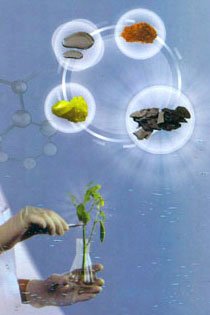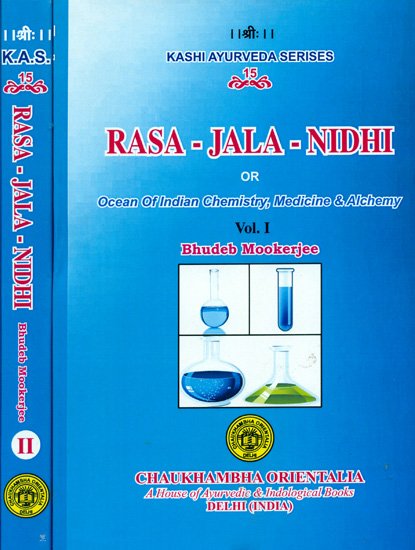Rasa Jala Nidhi, vol 1: Initiation, Mercury and Laboratory
by Bhudeb Mookerjee | 1938 | 67,774 words | ISBN-10: 8170305829 | ISBN-13: 9788170305828
This first volume of the Rasa-jala-nidhi includes preliminary information on Alchemy including initiation of a discpiple, laboratory setup, mercurial operations and commonly used technical terms. The Rasa-jala-nidhi (“the ocean of Iatrochemistry, or, chemical medicine) is a compendium of Sanskrit verses dealing with ancient Indian alchemy and chem...
Introduction
I bow down to the Greatest of the great, at the movements of whose blissful eyes the universe comes into being, undergoes dissolution, and is frequently absorbed in Himself—I bow down to Him who has conquered death, has been maintaining the universe from all eternity, and is the source of all greatness and magnanimity.
This salutary book, entitled Rasajalanidhi (the ocean of Metallurgy), is compiled very carefully by me, Bhudeba, a Brahman by caste, and descendant of the great sage, Bharadvaja, who, actuated by the motive of doing good to the suffering, humanity, brought down to Bharat (India), in the Treta age (about five hundred thousand years ago), the science of medicine from the country of Swarga (a country corresponding to modern Mongolia—a region from which the forefathers of the Aryan Indians migrated gradually into the plains of India[1] ).
For the fulfilment of all desires, I bow down to my parents, who are the sources of all bliss, and appear to me to be the parents of the universe itself. My father’s name is Harilala Deba, and that of my mother is Nistarini Debi. I come of the Mukhopadhyaya (meaning, great preceptor) family, and am favoured by the three-eyed Deity God). My parents are endowed with all good qualities, are descendants of the author of Naisadha Charitam (a well-known Sanskrit poem, composed by the great poet Sreeharsa, a savant from whom have descended all the persons. bearing the family name of Mukhopadhyaya, or Mookerji, as it is generally written in English for the sake of brevity), and residents of a village, named Hastisala, situated on the banks of the river Maurakshi, in the ancient region of Gangarastra (modern Rarh) in Bengal.
Metallurgy is a great science revealed to the world by God Himself at the commencement of the present Kalpa (a mundane period, followed and preceded by a dissolution of the universe—the present Kalpa commenced, according to Indian history, some 160,0000000 years back.)[2] It was introduced into India for the purpose of preventing disease and premature old age. This science, which is the giver of all wished-for objects, is now in a moribund condition, and is no longer given attention to by kings, whether Indian or foreign. Numerous were the books written on Metallurgy and Chemistry by ancient Indian sages. Most of these books have completely been lost; those which are extant are mostly very rare, and not very intelligible. The present book is based on many of those which are still extant, and have been collected carefully. It is written by the grace of the conqueror of death at the great city of Kalikshetra (Calcutta) in the year 5026 of the perverted Kaliyuga.[3]
Treatment of diseases by Rasa (mercury), gems, metals etc is divine; that by incantations and vegetable drugs human; and that by surgical instruments diabolical. Metallurgy is therefore to be learnt very carefully.
Footnotes and references:
[1]:
Vide ‘Original Home of Mankind’ written in Bengali by the late Pundit Umesh Chandra Vidyaratna.
[2]:
The theory of the creation of the universe out of nothing is untenable, in as much as it implies want and desire in God, and thus reduces Him to the level of a finite being. God is eternal, and so is the universe, which only undergoes periodical dissolution and change of form.
[3]:
According to the Hindus, eternity is measured by the following terms Kalpa, Manvantara and Yuga. Kalpa is the period which is followed and preceded by the dissolution of the universe. A Kalpa is sub-divided into so many Manvantaras, each of Which is again subdivided into so many Yugas.
Conclusion:
 This concludes ‘Introduction’ included in Bhudeb Mookerjee Rasa Jala Nidhi, vol 1: Initiation, Mercury and Laboratory. The text includes treatments, recipes and remedies and is categorised as Rasa Shastra: an important branch of Ayurveda that specialises in medicinal/ herbal chemistry, alchemy and mineralogy, for the purpose of prolonging and preserving life.
This concludes ‘Introduction’ included in Bhudeb Mookerjee Rasa Jala Nidhi, vol 1: Initiation, Mercury and Laboratory. The text includes treatments, recipes and remedies and is categorised as Rasa Shastra: an important branch of Ayurveda that specialises in medicinal/ herbal chemistry, alchemy and mineralogy, for the purpose of prolonging and preserving life.
